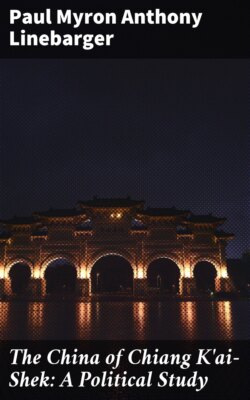Читать книгу The China of Chiang K'ai-Shek: A Political Study - Paul Myron Anthony Linebarger - Страница 27
На сайте Литреса книга снята с продажи.
The Political Ministries
ОглавлениеTable of Contents
Senior and most famous of all Chinese ministries is that of Foreign Affairs (Wai-chiao Pu). It inherits the splendid traditions of Chinese diplomacy, dating back to the redoubtable Pan Ch'ao, who almost single-handed conquered Central Asia in the first century A.D. by unsleeping guile and consistent boldness. Modern Chinese diplomacy has made the best of a hundred years of defeat, successfully exploiting the mutual suspicions of the imperialist powers. The morale and professional cohesion are high. Despite incessant political changes, the foreign office and diplomatic service have preserved their continuity from the Empire to the present. The Chungking government probably possesses a foreign office superior to the Gaimusho of Tokyo.[11]
The effectiveness of Chinese international statesmanship has aroused an almost superstitious dread among the Japanese, publicists, officials, and others. Japan consistently complains that China is superior at propaganda, and sees, behind the world-wide mistrust of Japan, occult forces from the Comintern or vile Chinese guile. After they perpetrated the Nanking horrors, insulted neutral men and women in Tientsin, machine-gunned a British ambassador, sank an American gunboat, and violated all available international law, the Japanese believed that British and American lack of sympathy was mostly due to the machinations of Chinese diplomacy. The recent Minister of Foreign Affairs, Dr. Wang Ch'ung-hui, a former Judge of the Permanent Court of International Justice (World Court), is one of the modern world's greatest legal scholars. Eminent in political leadership ever since the first foundation of the Republic, he has always urged moderation, legality, and intelligence in government.
The Ministry of the Interior (Nei-chêng Pu) forms the apex to China's constitutional system of provincial and local governments. In accordance with Sun Yat-sen's teaching, the National Government has consistently sought to reduce the importance of the provinces and to foster direct local-central intergovernmental relationships. The importance of this ministry is reduced somewhat by the fact that other agencies possess their own field services, and are therefore not obliged to route policy through it, but it remains significant because of its control and supervision of China-wide administrative development. The National Health Administration (Wei-shêng Shu), formerly separate, is now a department of this Ministry.
